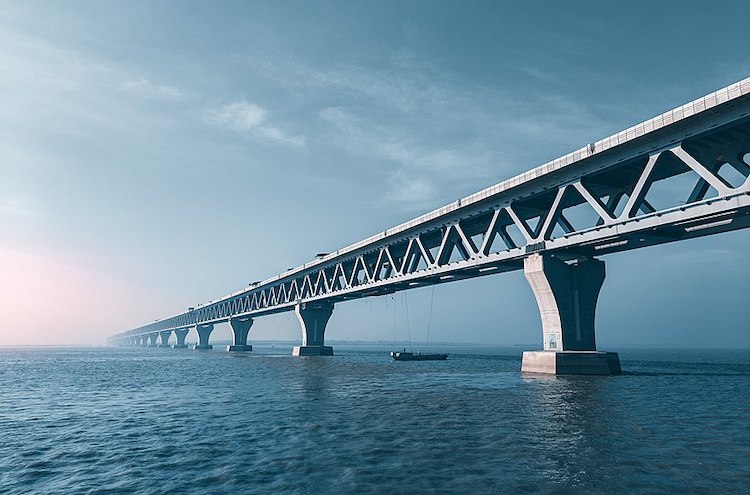By Bahauddin Foizee
DHAKA (IDN) — A historic infrastructure milestone for Bangladesh and now the longest bridge of the country, the newly-built Padma Multipurpose Bridge would now help grow Bangladesh’s GDP by 1.3% annually.
The US$ 3.86 billion worth mega-infrastructure was inaugurated on June 25 and is forecast to increase jobs, service sector activity and tourism in the country’s southwestern districts, connectivity to which was poor even a day before the opening of this bridge.
This world’s deepest bridge, which is a 6.15-kilometre multipurpose road-rail bridge, carries a four-lane highway on the upper level and a single track railway on the lower level.
Not a part of the Belt & Road Initiative
In one of its recent statements, Bangladesh’s foreign ministry clarified that the bridge is not a part of China’s flagship Belt and Road Initiative (BRI) and that it was entirely funded by Bangladesh, no foreign funds were taken.
It is worth noting that after the World Bank cancelled a US$1.2 billion credit in 2012, Bangladesh decided to build the bridge using its own fund. The decision was perhaps inspired by the government’s realization that they could gain some popularity if they could fulfil the dream of millions of Bangladeshis who wanted good connectivity between Bangladesh’s richer and well-connected northern and south-eastern regions to its poorly-connected southwestern districts.
Agro & tourism industries to get a boost
Until now, the journey to the southwestern districts on the other side of the gigantic Padma River took hours. First, boarding on the ferries and launches took hours, followed by the journey itself which took three to four hours. Furthermore, bad and/or high pressure of vehicles meant the journey took even longer. The connectivity through Padma Bridge has now reduced the hours-long travel time to only seven or eight minutes.
Until now, because of poor connectivity, the transportation to the richer northern markets — including the capital city Dhaka—cost more for farmers, growers and traders from the country’s southwestern districts’ crop, fruit and fish industries. This has been forcing them to sell their products to only nearby districts, with lower prices.
However, the newly built Padma Bridge will alter the scenario by providing easy access to northern markets and scope for higher selling prices. The highly-demanded Hilsa (Ilish) fish, for example, is forecasted to get at least 20 to 30 per cent higher prices, contributing to the increase of the fish industry’s worth by millions of U.S. dollars.
Furthermore, the number of tourists is forecast to increase progressively because of this new reality. The current daily number of 10,000 tourists is forecast to increase by twofold this year alone, meaning more employment for the locals and more revenues for both local and national governments.
Accordingly, higher profits are expected for the existing hotels in the southwest, while more businesses are already lining up to open hotel, motel and rest-house businesses in these southwestern districts, according to Draft PaperWork, a service-business providing business consultancy & documentation services.
Ruling party could gain popularity in the southwest
The construction of the Padma Bridge, which now connects the country’s heartland to the poorly connected southwestern region, may impact the ruling party’s popularity in the southwestern districts and beyond.
The social media influencers, media outlets, media personalities and cricketers have been, for the last half a decade, continuously praising the ruling party for the country’s overall economic and infrastructural developments. Already the national cricket players, whom Bangladeshis view as their super-heros, cut a huge cake having the imprint of Prime Minister Sheikh Hasina with the Padma Bridge in the background and posted tweets about this.
While the cricketers’ celebration took place abroad during their tour in the Caribbean, the TikTok and YouTube influencers at home too crowded the Padma Bridge for promoting and endorsing the bridge.
Although many smell the ruling party’s shadow in the current hype and the hype of the past half a decade regarding the newly-built mega-infrastructure, it is undeniable that the Padma Bridge will bridge the development of the other parts of the country to that of the southwestern districts.
Hence, the ruling party’s campaign to repeatedly publicize the country’s recent developments, including the Padma Bridge project, could now pay off in the next general election.
Indeed, from the scenarios unfolding in the last few days surrounding the inauguration of the Padma Multipurpose Bridge, it would be prudent to say that the traditional and social media’s half-a-decade-long publicity has led the people from the southwestern districts to believe that their fate is about to change because of the ruling Awami League’s effort in improving connectivity for their region. This indeed is a political masterstroke by the ruling party, which may, therefore, experience an increase in their popularity in the country’s southwest before the coming general election due at the end of 2023 or early 2024.
This article was originally published on Oped Column Syndication. [IDN-InDepthNews – 09 July 2022]
Photo: Beautiful morning view of Padma Bridge under construction, on a November Morning. CC BY-SA 4.0
IDN is the flagship agency of the Non-profit International Press Syndicate.
Visit us on Facebook and Twitter.
This article is published under the Creative Commons Attribution 4.0 International licence. You are free to share, remix, tweak and build upon it non-commercially. Please give due credit.

